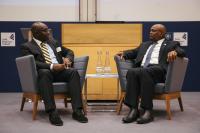African Studies Centre and Saïd Business School host President Masisi of Botswana
On the evening of 10th October, the African Studies Centre, in conjunction with the Saïd Business School, had the fortune of welcoming H.E Mokgweetsi EK Masisl, the fifth President of the Republic of Botswana, to the University of Oxford. The event was very well attended and was followed by an audience Q&A moderated by Professor Wale Adebanwi, Director of the African Studies Centre, and the Rhodes Professor of Race Relations.

President Masisi’s lecture, entitled ‘Democracy and Development in Africa’, provided a platform for further discussions of development across the African continent. The topic of the lecture is of little surprise, as against a backdrop of limited democratisation in postcolonial Africa, Botswana has long been perceived as the ‘African miracle’. President Masisi’s lecture certainly conformed to this narrative, and the President offered-up lessons and experiences from Botswana’s ‘prudent management of resources’ for ensuring prosperity.
Those who follow political developments in Botswana will know that its success story status came under increased scrutiny during the administration of President Masisi’s predecessor, President Seretse Khama Ian Khama. Khama (2008-2018) was accused of ‘creeping authoritarianism’ and a number of red flags were raised regarding the quality of democracy in Botswana. Following this period of controversy, the question on all commentators’ lips has been whether President Masisi is likely to continue Khama’s policies, or mark a departure. Considering this uncertain context, President Masisi’s address on matters of democracy and development in Botswana was all the more relevant.
President Masisi began his lecture by stating that at independence (1966) Botswana was among the least developed countries in the world, and was regarded as a ‘hopeless basket case’. This change in circumstances, he said, bears testimony to the fortitude of Botswana’s ‘forefathers’, and demonstrates that ‘where there is a will, there is a way’. Speaking on how Botswana’s success came to be, President Masisi consistently highlighted the links between Botswana’s democratic development and its economic success, stating that Botswana’s principles of good governance (such as independent institutions and the rule of law) has ingrained a culture of ‘sustainable peace and tranquility’, which has enabled Botswana to continue to enjoy relative economic prosperity.

Perhaps the most emphasised element of President Masisi’s lecture was his reiterations that Botswana’s resources are a collective national good, rather than for individual exploitation. President Masisi praised the ‘bottom up’ approach, and referred to the people of Botswana as the most valuable resource. Of the relationship between this and democracy, President Masisi said that the profit made from the resources is invested into social services, ensuring everyone benefits and further stressed the mutual reliance of democracy and development in Botswana. As he put it, ‘our diamonds, our diamonds, our diamonds, are for development’.
Throughout his eloquent address, the President consistently referred to the mutually supporting relationship between democracy and development in Botswana. However, I was left confused as to whether President Masisi’s lecture was evidence of Botswana returning to its previous commitment to democratic ideals, or whether the President was merely continuing to play up to the success story narratives.
However, President Masisi in both the last part of his talk, and in the Q&A, engaged more frankly with Botswana’s imperfections. When concluding the lecture, President Masisi iterated that Botswana remains committed to strengthening institutions which play an oversight, including free press and an independent judiciary, and is actively seeking to strengthen existing anti-corruption legislation. The topic of challenges facing Botswana was a line of questioning continued in the Q&A, with President Masisi openly acknowledging Botswana’s need to diversify its economy and combat youth unemployment.
President Masisi was also equally forthcoming in acknowledging the challenges facing social development in Botswana, such as violence against women, and gender inequality. The President admitted the need for improvements in this area and discussed the need to empower females, to ensure they aren’t ‘choice disabled’.
When questioned about the decline of democracy under his predecessor, President Masisi proved more reluctant, particularly on matters relating to the security services and authoritarianism. However, despite his hesitations, the President did reveal that his reasons for firing the former Director General of the Directorate of Intelligence and Security Services, Isaac Kgosi, were ‘so good they cannot be shared’, but that they were driven by a commitment to good governance. The President further admitted that he would not be continuing along the lines of the Khama government, and said that more needed to be done to challenge corruption in Botswana.
All in all, the prospects of democratisation and development remain among the most central and open questions in post-colonial Africa, and President Masisi’s lecture on the Botswana story provided an important counter narrative to the prevailing afro-pessimism. Further to this, President Masisi’s lecture, and the further discussion of Botswana’s challenges, acted as a clear reminder that is important to see democracy and development as oscillating journeys, requiring constant evaluation, rather than linear tick-box procedures.





